 For me this has been a great Winter, with the release of two computerized board games, Ticket to Ride from Days of Wonder and Puerto Rico from Eagle Games. Don't get me wrong: I love tabletop games. That's clearly the proper way to play These Games of Ours, because you get the joy of the physical components and real interactions with real people.
For me this has been a great Winter, with the release of two computerized board games, Ticket to Ride from Days of Wonder and Puerto Rico from Eagle Games. Don't get me wrong: I love tabletop games. That's clearly the proper way to play These Games of Ours, because you get the joy of the physical components and real interactions with real people.Sometimes, however, I prefer a solitaire experience, and for this I look hopefully toward PC conversions. And, I'm not talking about games that allow good online play. That might be a nice add-on, but if I want to kick a game out in 5-30 minutes I don't want to have to deal with someone else's slowness, and if I'm feeling tired or grumpy, I don't want there to be any expectation that I'm going to actually talk to someone else. So I look hopefully not just toward PC conversions, but toward PC conversions with good AIs that can really give me a challenge.
Over the last couple of years I've played slews of these games in web-based forms, but the best are inevitably those that I can download from a professional site or purchase on a CD, and I've decided to offer an overview of those today. You'll find them listed below, from my favorite to my least favorite, with some comments about what makes them good ... and what doesn't.
As I've written this article, I've been somewhat frustrated to learn that a couple of the games are no longer commercially available, but I've still included them herein to document what I think makes a great computer game.
Carcassonne (A/B+)
Full Review: http://www.rpg.net/reviews/archive/11/11234.phtml
Purchase Link: Softunity.com (German, original game no longer available)
Carcassonne is, flat-out, the best adaptation of a tabletop boardgame that I've played. To start off with, it adapts the game faithfully. But, beyond that, it hits all the right notes for a computer conversion.
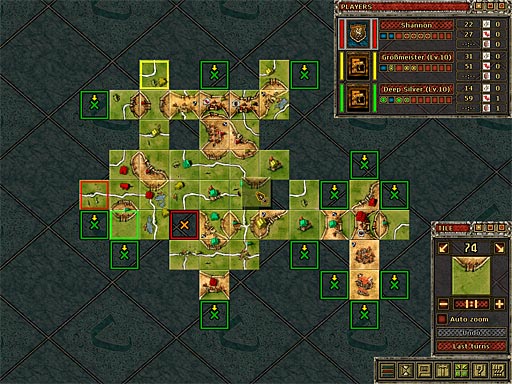
Viewing size is always a bit of an issue with board games, but Carcassonne manages that well: it allows a variety of zoom sizes, and you'll probably slowly zoom out during the game. At the largest size everything is huge and easy to see. At the smallest size you can usually see the whole board (though not always when you have the additional tiles from the supplements). Some effort was apparently made to slightly simplify the tiles, which helped a lot in viewing them at greater zooms.
Beyond that, Carcassonne also goes the extra mile. There are a bunch of different skins for the board and for your playing pieces, so that you can modify the game view to your precise preferences. You can also choose from a set of different rules, such as all the different farmer rules, whether to use the river or not, etc.
Carcassonne truly shines in two areas: its AI and its ranking. First, there are ten different levels of AI, which indeed get progressively tougher. It took me a few months of improving gameplay before I finally felt comfortable playing against the "7"s and the "8"s. Now I can play against the "10"s with a fairly decent chance of success, but I'm well aware that if I show the slightest weakness, they'll crush me. I don't do nearly as well against the AIs in Hunters & Gatherers, which seem a little slower & a lot brighter.
Combined with this, Carcassonne has a ranking system that I suspect is ELO based. You win or lose points as you play opponents, based upon comparative rankings and thus expectation of victory. Trying to struggle up the ladder against the AIs adds a whole extra dimension to this gameplay.
Softunity originally offered the original Carcassonne, plus an expansion which included Inns & Cathedrals and Traders & Builders. They also offered, in a very similar package, Carcassonne: Hunters & Gatherers. It looks like the original game may no longer be available through them, but they still have H&G, and I highly suggest it. You'll have to struggle through German pages to purchase the game, but once you get it downloaded you can just change the language to "1" in your configuration file, and it'll turn into English. I'll also comment that my rating for Hunters & Gatherers alone (B+) isn't quite as good as my rating for Carcassonne with the expansions (A). I really think the expansions add a lot to the replayability of the game.
Ticket to Ride (A-)
Full Review: http://www.rpg.net/reviews/archive/11/11899.phtml
Purchase Link: ticket2ridegame.com
Ticket to Ride is overall a strong computer game, but its strength comes through a criteria that I've partially disavowed here: multiplayer play. Of all the games that I'm reviewing here, Ticket to Ride is the only one that's reached critical mass for an online community of players, and it's done a superb job there. Games start every few seconds any time of the day or the night.
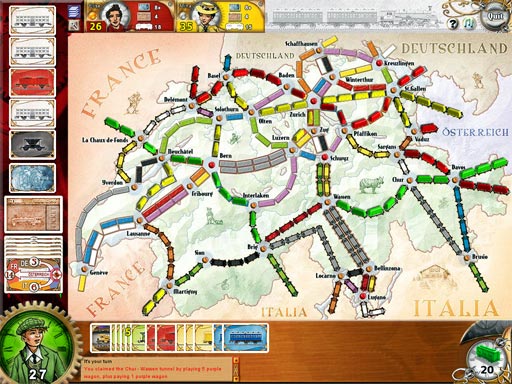
Graphically, Ticket to Ride doesn't come across quite as well as the games developed by actual software houses. The graphic design is quite nice, but it's fairly flat, as opposed to the more 3D feels of Carcassonne and Samurai. The user interface also feels somewhat basic, and I suspect this has something to do with the game's ancestry. It's a Java-based implementation (but a solid one, without the rocky feel of some Java clients that I've played ... and developed).
Ticket to Ride actually includes three different games, the original U.S. map, Ticket to Ride Europe and finally a Switzerland map that's only available as part of this package. That last feature highlights how the best computer games can really expand a game for a fairly low cost.
As with many computerized board games, Ticket to Ride's failing is its AI. The AI is poor. I usually play three-person games, and one of the AI's manages to win 5-10% of the time. There's not much tension in the games as a result, and if it weren't for the fact that Ticket to Ride is creative and constructive, like Iron Dragon, but at a smaller scale, I wouldn't get a lot out of solitaire Ticket to Ride play.
Again, note that this is all in reference to Ticket to Ride as a solo activity. For multiplayer play the CD version of the game is a great step-up from the online versions of the games, and it also allows you to play the unique Switzerland map with other people online.
Puerto Rico (B+)
Full Review: http://www.rpg.net/reviews/archive/11/11988.phtml
Purchase Link: eaglegames.net
In many ways, Puerto Rico is an ideal candidate for computer game conversion. It's got sufficient depth of play and sufficient variability that you'll want to continue playing it again and again. Unfortunately the current version of Puerto Rico has some UI problems that leave the game lacking. It's still worth getting, mind you, if you enjoy Puerto Rico, but I do have concerns with it.
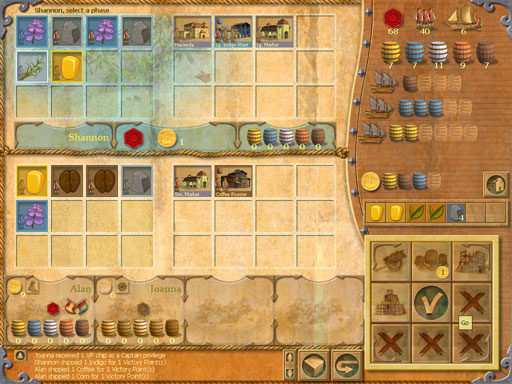
Graphically, Puerto Rico is a pleasure. Like Ticket to Ride, it's fairly basic, but looks nice. Excellent design work has been done to create an interface full of wood, rope, and texture. You can easily see all of your plantations, your buildings, the current state of the ships, the current state of the trading house, and how many VPs, settlers, and goods remain. There's a bit of an information overload, but you get used to it. You only get to see complete info on one opponent at a time, but you can see everyone's goods, and you can click in between different opponents if you want.
The game also made the excellent decision of including the expansion, which adds a huge amount of variability to the game.
The AI is just adequate. As a casual player, I don't overwhelmingly defeat the computer players, but I suspect if I paid more attention I'd win more often than not. Still it's clearly better than the bad AIs I discuss herein (Ticket to Ride, Iron Dragon, and El Grande).
Where the game starts to fall apart for me, however, is the turn sequencing. The game just whizzes through all the players' turns, and there's no particular attention given to what they did. You can read a textual display at the bottom, but I find that pretty inadequate. The game will even skip parts of your turn if the choices are "obvious" (such as when the trader phase was called and you can't trade for whatever reason). Overall I have a huge sense of isolation when I play the Puerto Rico game. I can't follow everything that's going on without a fair amount of concentration, and there's no meaningful contextual sounds of other prompts that would help me keep track of things.
I suspect some of this would improve if playing with players rather than AI, because their turns wouldn't go as fast, but as I said I'm evaluating these programs as standalone games that I can play on my own, and although Puerto Rico is technically sucessful in that regard, I wish a lot more attention were paid to player experience rather than to pretty graphics.
Reiner Knizia's Samurai (B)
Full Review: http://www.rpg.net/reviews/archive/10/10879.phtml
Purchase Link: Klear.com (demo only)
Samurai was a game that I played for the first time in computer game form. It was many months before I picked it up as a tabletop game. Like Carcassonne, it's a very faithful rendition, and like Carcassonne it also offers a few additional methods of play.
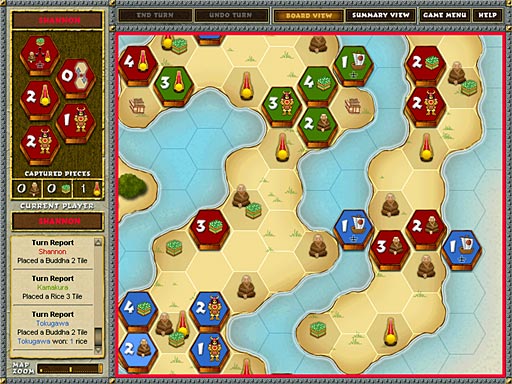
Among your choices: a more random method of setup; seeing current scores before the start of each of your turns; and a different endgame condition where everything is removed from the board. However the best extension was offered with version 1.5 of the game: a couple of new maps so that you can play Samurai on some dramatically different gameboards. They were even certified for use by Reiner Knizia himself. Like the new map in Ticket to Ride, this really helps the game to shine.
Samurai's AI is fair to good. It comes in three different levels. None of them is good enough to stand up to a good human player in head-to-head play on a regular basis, but none of them embarass themselves, and the best AI will at least keep a good player on his toes. However Samurai is one of those games that gets more chaotic (and less strategic) as you increase the number of players. This gives the AI the edge that they need. In a 3-player game I feel pretty well matched against the two higher level AIs.
There are some small nuisances with this game. In the 4-player version I can't quite see the whole map without scrolling even at the highest zoom, and I prefer not to zoom to that level because the board gets a little blurry. There's no high score list and no ranking, so nothing to really shoot for in a solo game, other than an individual win. But still, it's a very well done implementation, with its variant rules and variant maps showing a lot of the power of a computer adaptation of a board game.
(Ultimately Samurai is rated a little lower than some of the other offerings here because its replayability is lower. I've largely played out the game in computer form after 60 or 70 games, while Carcassonne is still going strong hundreds of games in, and Ticket to Ride maintains its interest if you have human opponents, though not necessarily if you're playing against the AI.)
Rail Empires: Iron Dragon (B)
Full Review: http://www.rpg.net/reviews/archive/10/10393.phtml
Purchase Link: Irondragon.org
I enjoy Iron Dragon at a level that's much higher than its programming deserves, and that's mainly because it's an ideal game for translation. I really enjoy the Empire Builder games because they're creative, constantly different, and fairly deep. Unfortunately the game length keeps me from playing more than a couple games a year. Having a computer game that I can play whenever I feel like it, and that plays twice as fast as the tabletop version is a godsend. It's a way to play a game that I couldn't otherwise.

Unfortunately, Iron Dragon is starting to look like old technology. The previous games I described all have slick interface and/or high-quality graphic design. Iron Dragon meanwhile has a very flat, hand-drawn looking board. (Mind you, that's a huge jump up from the plain white Iron Dragon board game map.) Something about the interface just looks old to my eye.
As with many of the other games, Iron Dragon gives you some nice options for different play. There's some variant rules for different locomotives, cross-grades, and loans (and a bunch of other options that I don't use). They don't create variability like those new maps and such that I described above, because I just set my defaults and leave them, but at least I get to play exactly the game I want.
Moreso than any of the earlier games, Iron Dragon tries to use its existence as a computer game to make things that were hard on the tabletop easy on the computer. Most notably you can click tickets to quickly jump to sources or destinations, which probably shaves 30-45 minutes off any game on its own. Unlike some of the other games, there's no way that Iron Dragon could ever show you its whole map at once, but the game easily corrects for this, by jumping around the board as your opponents take their turns, so you can always see what they're doing.
Unfortunately, Iron Dragon has a notable problem too: the AI is very bad. Bad to the point where in a 3-4 player game against 2-3 AI, one of them usually gets stuck and can't continue on. (I've on occasion run over a stuck AI's track out of mercy, just to give them a little money and get them going again.) Also, I feel like the AI has close to zero chance of actually winning. It's often $100k behind me in total revenues raised over the course of the game by the time I win. If Iron Dragon weren't such an experiential, creative game, these would be fatal flaws, but because I enjoy laying the tracks and the experience of earning money as fast as I can, it works. I'm pretty sure that Iron Dragon is my third-most played board game conversion (in solitaire hours spent, if not total plays), right after the aforementioned Carcassonne and Samurai, and it may end up passing Samurai up, now that I play the latter much less.
El Grande (B/B-)
Full Review: None
Purchase Link: Softunity.com (German)
As I wrote in my gaming thanksgiving, El Grande was my stairway game, the one that introduced me to the depth possible in German games. I was thus very excited when I downloaded a copy of the El Grande computer game and bitterly disappointed (at least initially) when I actually tried to play it.
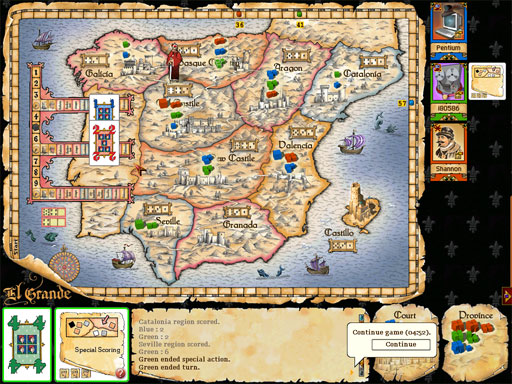
It's not what really turned me off, but I find turns on El Grande slightly hard to follow. Mind you, the game does most of the right things: showing other players' moves with animated displays that catch the eye, and pausing in between some turns. There's just so much information in El Grande that it's sometimes hard for me to keep track of what happened without the visceral feeling of a board in front of me (and there's also some slight room for improvement, such as the need for a better contrasted and longer-lasting highlight for recent moves).
Where El Grande really falls apart, however, is in the AI. There are two general classes of AI within El Grande: the dumb ones and the smart ones. The dumb ones are atrociously, embarassingly bad--as bad as the AIs in Iron Dragon that regularly get stuck. They do stupid things like always moving their cubes from the castille to Galacia. Even if the king's there.
The smart ones, meanwhile, are quite good. They're going to keep kicking my butt until I can get a better handle on the game and better concentrate on what's going on. Unfortunately they're built very slowly and ineffeciently. Until recently I was using a circa 2000 IBM NetVista machine, and whenever one of the smart AIs got a complex move (usually involving an intrigue card) it was take 2-4 minutes to figure out what to do, which is utterly unacceptable in a computerized board game.
So until recently I found El Grande utterly unplayable, because I wasn't willing to sit watching my computer think and unlike Iron Dragon it's not a sufficiently experiential game to enjoy even if your opponents are laughably stupid. However, in January I started using a machine that's several times better than my previous one, and I've been delighted to find that the El Grande smart AIs now run in an acceptable amount of time. The worst lag I see is 5 or 10 seconds, not several minutes.
So, last month I wouldn't have recommended El Grande at all. This month I can say that it's probably OK if you have a decently modern machine, though I'm still a bit unhappy that there's no middle ground: the dumb AIs are pathetic, and the good AIs kick my butt.
El Grande is a German release, but as with the Carcassonne releases, there's a simple flag you can flip in one of the config files to turn English on.
Conclusion
It's been great to see the increasing release of German board games as computer games in the last few years. I hope to see more of them in the future, either great standalone releases like Carcassonne or even great, well-supported online releases like Ticket to Ride.
There's still some lessons to be learned with AIs and with UIs, and I'm going to talk more about that in a future week, but for now I hope that more companies will be producing more of this like, hopefully with some lessons learned from the current crop.
7 comments:
I ran into the lag problem with El Grande, too. But just the other day, I figured out a workaround. All you need to do is ALT-TAB away from the program and wait. It will play a short guitar riff to let you know when it's finished thinking.
It's a bit inelegant, I'll grant, but it sped up the smart AIs from a couple of minutes to a few seconds.
Nice post, Shannon.
Excellent post... Well said nd everything, but i have to warn people:
The latest, computerized and quite commercial version of Diplomacy is horrible. Awful and disgusting.
Just a warning
Again. Great post.
Out of curiosity, what makes it bad?
There is no chat feature, the movement proposal system is totally strange and unwieldy, there is no hot seat option, the graphics are horrible, the AI abysmal and it costs far too much...
The older Microprose (I think) game was much better...
Iron Dragon looks old because it is old. It was published in 2000 for Windows 98.
If you download the most recent version, you can play online using the build-in connection zone. 2 and 3 player online games are pretty good, though you sometimes have to wait a while for someone to show up to play.
Great post, thank you very much!
Post a Comment